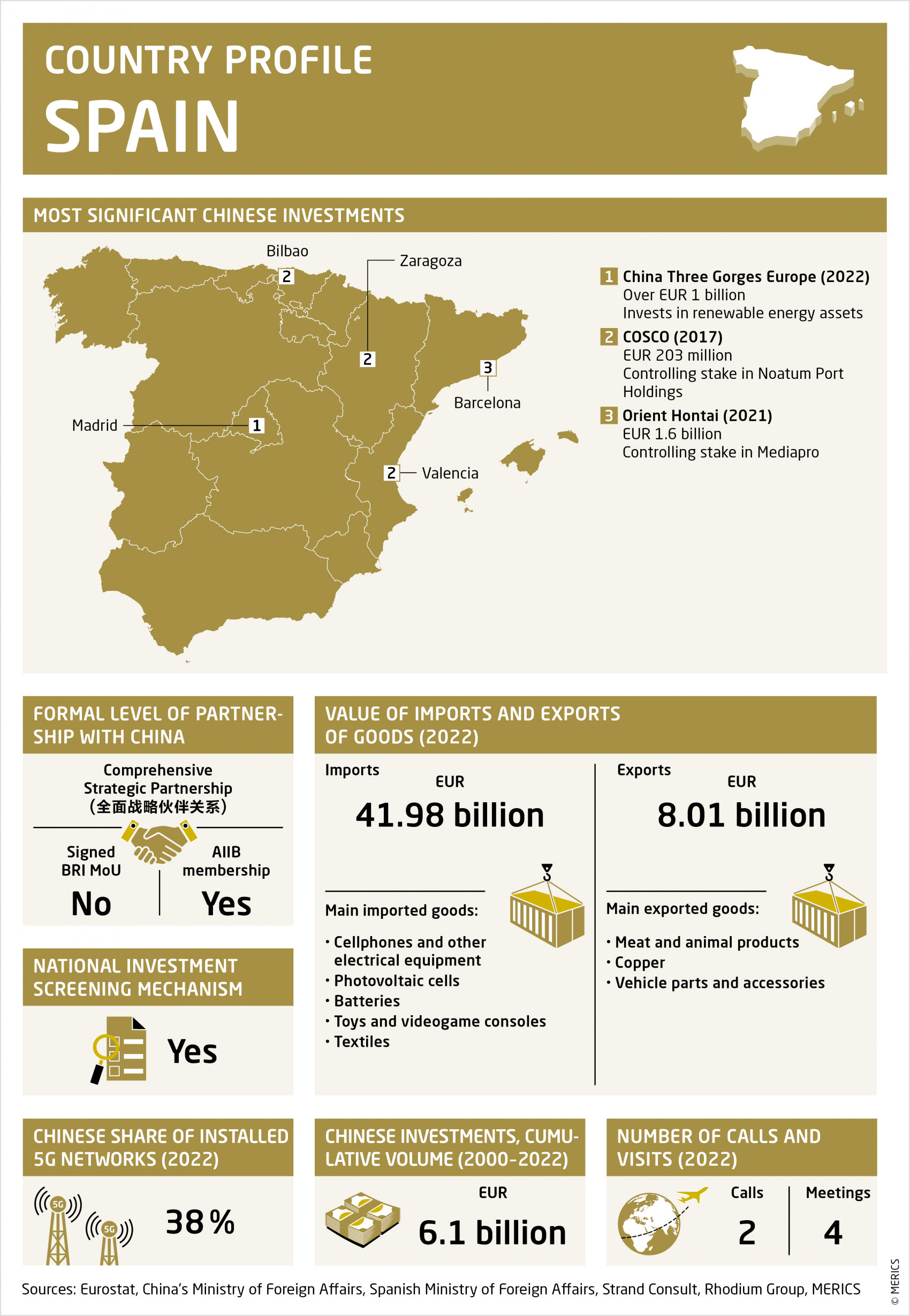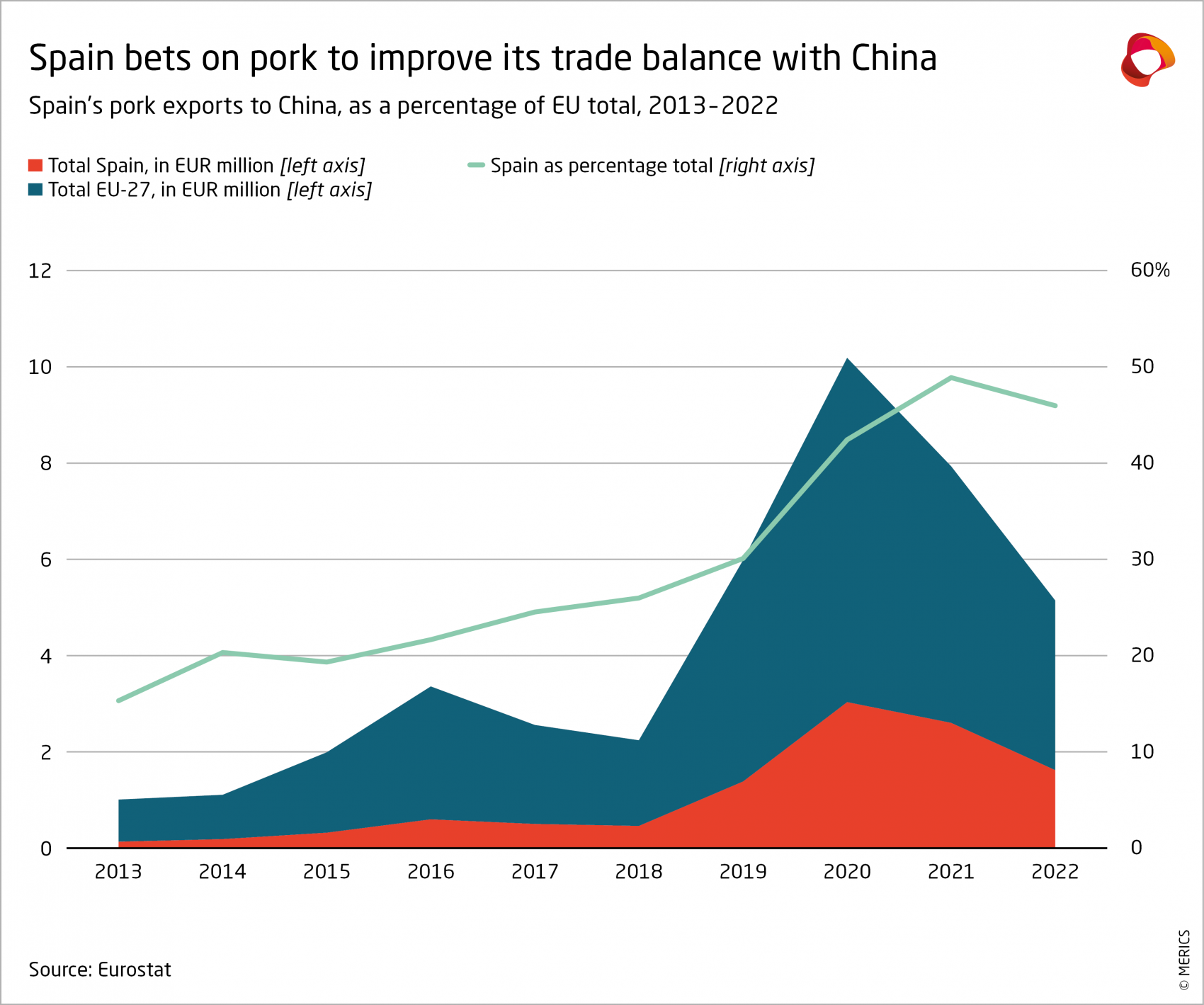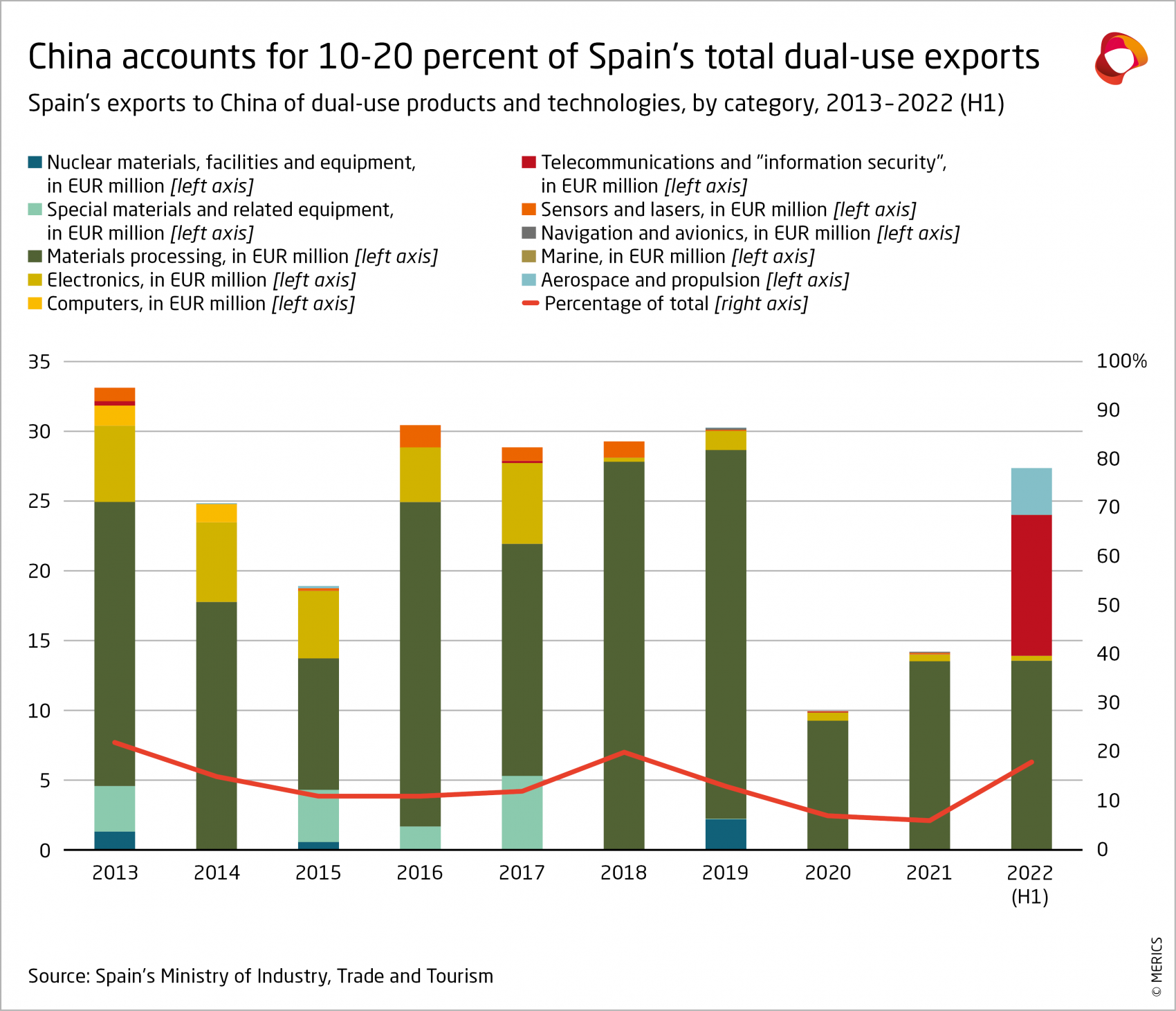

Country Profile: Spain
You are reading the country profile for Spain. Click here to go back to the country profiles overview page.
1. Introduction
China is not a priority in Spanish foreign policy, beyond the economic arena. China barely made it onto the agenda in 2023, though the year marked 50 years of diplomatic relations and Spain held the European Council’s rotating presidency, although Prime Minister Pedro Sanchez made a short, relatively low-key trip to China in March.
Spain’s China policy is often made in Brussels. Spanish public debate about China is limited and expertise is scarce, albeit growing. This is unlikely to change regardless of who heads the government when Spain’s current political deadlock is resolved. Madrid’s approach is a good example of the Europeanization of China policy that has taken place across much of Europe in the last four years. As this is likely to continue, Spain is unlikely to lead on China, but nor will it create obstacles to EU consensus.
2. Key Categories
Economy
Spain has more limited economic ties with China than other big EU member states. Even so, China is key for the Spanish economy. In 2022, imports from China totaled EUR 41.98 billion, or almost 9 percent of Spain’s total imports, while Spanish exports to China were worth slightly more than EUR 8 billion (about 2 percent of Spain’s total exports). Their trade relationship is highly asymmetrical: Spain’s trade deficit with China was almost EUR 34 billion in 2022 – the fourth highest in the EU after the Netherlands, Italy and Poland.
Chinese investments have drawn comment as they center on critical infrastructure and renewable energy, a sector where Spain is strong globally. But they totaled only EUR 600 million in 2022.
Madrid’s focus is on how to expand and balance the trade relationship. There is a secondary emphasis on increasing the presence of Spanish firms in China (currently about 600-700 firms) as companies, and some within government, continue to see the Chinese market as a big opportunity.
Spain is betting on its thriving pork industry to redress the trade balance. It is Europe’s top exporter of pork to China (worth EUR 2.6 billion in 2021, or 30 percent of Spanish exports to China). In 2018, President Xi Jinping visited Madrid and a bilateral agricultural agreement was signed. Exports of pork products subsequently skyrocketed, also helped by China’s bans on pork from other European countries because of swine fever outbreaks. (An outbreak in a single region brings a national ban as China does not apply regionalization criteria.)
Spain’s bet may prove risky. Beijing often targets agricultural products first for economic retaliation, so a trade relationship heavily reliant on meat products could make Spain vulnerable to economic coercion.
Politics
Spanish political attention rarely lands on China. As Brussels has given China-related policy issues a more central role, the process has been mirrored in Spain. But, as Prime Minister Pedro Sanchez’s March 2023 meeting with Xi Jinping in Beijing showed, stronger economic and commercial cooperation still top Spain’s agenda.
Political engagement between the two capitals is limited: only two calls and four meetings took place in 2022, mostly on the sidelines of multilateral events. Spain has no specific China strategy. It is guided by its broader External Action Strategy, and tends to reflect EU approaches.
Overall, China policy remains a mostly technical issue, the purview of diplomats and specialized units of civil servants. The main political parties, such as the conservative Partido Popular (PP) or socialist PSOE, dedicate very few resources to discussing China. Only the far-right Vox party consistently raises the topic in parliament, with negative views of the CCP that often echo the narratives of the US Republican Party.
Security
China is not seen as a direct security threat in Spain. However, recent EU debates have heightened risk awareness, spotlighting critical infrastructure investments, and Huawei’s role in Spain’s 5G network. However, economic considerations take precedence. Madrid has yet to make a clear decision on Huawei; it is likely waiting for a European consensus to avoid sticking its neck out and attracting retaliation.
Spain used to have one of the EU’s closest law enforcement cooperation relationships with China. According to Xinhua, it was the first “developed Western country” to sign an extradition treaty with China in 2005. A sweeping joint police operation in 2016 led to the arrest in Spain of more than 230 Chinese and Taiwanese citizens suspected of fraud. Spain extradited most of them regardless of strong domestic and international criticism – including Taiwanese passport-holders – to China in 2019, in the first large-scale extradition from Europe to China. The relationship has cooled substantially since Beijing’s handling of the Covid-19 pandemic and its stance on Russia’s war in Ukraine.
Military and defense relations have been much more limited. There were no high-level engagements between Spain’s military and defense ministry between 2019 and 2022 except in UN peacekeeping operations. Arms and dual-use trade data, however, paints a different picture. Despite the EU’s arms embargo, Spanish companies export dual-use products and technologies to China, taking advantage of the gaps in existing export control regimes (as do firms in other European countries).
Unusually, Spain publishes annual reports detailing its exports of military and dual-use equipment. Exports to China tend to be about 10 percent of Spain’s total dual-use exports. They are typically machine tools, protective and detection equipment or circuits and electronic components. The vast majority goes to private Chinese companies, though this is no guarantee that they will not end up being used by the PLA or law enforcement.
Society
Public perceptions of China have worsened substantially in recent years, accelerated by the Covid-19 pandemic. Pew Research data shows 46 percent of Spanish people had a poor view of China in 2012, when Xi Jinping was named CCP General Secretary. It rose to a record 66 percent in 2022.
But this sentiment does not seem to have dampened people-to-people exchanges. Until the pandemic shut down travel, there was an upward trend in the numbers of Chinese tourists, of Chinese citizens living in Spain and Chinese students at Spanish universities. Up till 2022, the number of Spanish citizens resident in China also grew.
Tourism has yet to recover from the pandemic. Visits remained extremely low with only 56,646 arrivals in 2022 (when China still had rolling lockdowns), compared to 700,748 in 2019. It is not yet clear if this reflects lagging pandemic restrictions or tenser future geopolitical dynamics. Tourism represents around 12 percent of Spanish GDP, so Madrid is working hard to attract more Chinese tourists.
Spain has not joined the trend to shut down Confucius Institutes (CIs) to prevent the spread of CCP propaganda. It had eight Confucius Institutes in 2022 and an agreement was signed in 2023 for another at the University of Sevilla. The University of Salamanca, well-known for language training, is also reportedly seeking to set one up.
You were reading the country profile for Spain. You can return to the country profiles overview page here.

This MERICS analysis is part of the project “Dealing with a Resurgent China” (DWARC) which has received funding from the European Union’s Horizon Europe research and innovation programme under grant agreement number 101061700.
Views and opinions expressed are however those of the author(s) only and do not necessarily reflect those of the European Union. Neither the European Union nor the granting authority can be held responsible for them.


